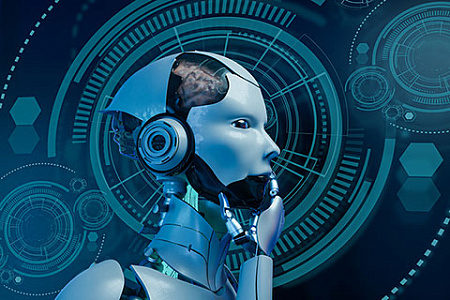
The ongoing competitive race between states and private companies to create various models of artificial intelligence (AI) has a positive impact on the development of this area. In a short time, a large number of AI systems have appeared, and anyone can use their services.
Everything that is known to mankind, transferred to electronic form, is the basis on which AI builds its assumptions, compiles answers and creates new works. The amount of information that AI uses is beyond the control of an ordinary person. The speed of information processing is also beyond control. And this leads many experts to believe that AI will replace humans and that this poses a direct threat to humanity.
However, it doesn’t hurt to remember that AI uses known information and generates its answers based on it, and therefore depends entirely on the information received by humanity. This is exactly what the philosopher and physicist Pavel Florensky wrote about back in the early twentieth century. In his works “Imaginations in Geometry” and “Iconostasis,” he gave the representation of reality in human creativity and representations the character of imaginary space.
Thus, the more accurate the representation of reality in an imaginary space, both human and AI, the better their answers and creative possibilities. Actually, this is the answer to the question of how the relationship between humans and AI will develop.
Humans not only control AI, but also, most importantly, acquire new information as a result of scientific research and creative pursuits. It can be assumed that the emergence of AI is objectively justified and is humanity’s response to the amount of scientific and general information that has appeared recently. Without AI, the further development of humanity becomes difficult due to the complexity and deepening of information. The emergence of AI places serious demands on the quality, volume and accessibility of information, which, in turn, makes it necessary to conduct the broadest scientific research in all spheres of human activity, relationships and the nature of Nature.
The development of AI raises the question of the role of man in the new reality and his purpose. The gradual replacement of human activity with various AI–controlled equipment and mechanisms suggests that humanity’s destiny is to enjoy life when everything is done for it with the help of AI. However, this approach contradicts the internal logic of Nature, where everything is brought into balance for the functioning of life on the planet.
Parasitism and consumption, which does not give anything in return, according to the strict laws of Nature leads to the death of such a population. Nevertheless, the purpose of man is not to enjoy life, but to know Nature and to rebuild it on the basis of knowledge, for its effective development and enjoyment of the result. And it’s still a reward, not a goal.
But if cognition is the goal and destiny of mankind, and AI uses the knowledge acquired by mankind to develop new effective solutions, then there is a symbiosis of man and machine in the study and knowledge of the mysteries of Nature, which is internally consistent and serves the common development.
The emergence of AI in humanity represents another very interesting opportunity – to preserve memory and even, to some extent, human immortality by creating an imaginary image of it.
There is a well-known expression: “A person is alive as long as he is remembered.” Its justice lies in the fact that a person’s life is always connected with his social activities and family. In both places, he leaves a memory of himself, not only from communicating with him, but also in connection with the results that were obtained during his life. The world remembers Pythagoras and Aristotle, Copernicus and Newton, Einstein and Mendeleev, scientists, philosophers, writers, and composers who left their mark on history, documents, and the memoirs of their contemporaries. It is in the presence of documents, work results and certificates that a person lives after death. This memory is supported by historians in their works and publications, readers of works, performers of musical works, etc.
But it is impossible to communicate with those who have passed away, it is impossible to ask a question on a topic of interest, it is impossible to find out the opinion of a person who has passed away. Many people probably saw dreams with departed people as phantom situations where familiar people acted. But this is not a controlled process, but an individual game of human intelligence.
In turn, AI is already providing the opportunity to generate a real image of a person, and these deepfake technologies have been cleverly used by both filmmakers and scammers, replacing the image of one person with an imaginary image of another. At the same time, the reality on the screen is such that the communicator cannot distinguish a fake. Fundamentally important in this situation is the presence of a screen that displays not an imaginary image of a person, as in a mirror, but an imaginary image generated by AI. This opens up the possibility of communicating not in a dream, but with the imaginary reality of the image.
Probably, quite soon, given the speed of development of AI systems, there will be a service for creating images – first of outstanding people, and eventually of any loved one with the possibility of personal communication. This can seriously change both the morality of society as a whole and the behavior of an individual who is interested in preserving a good memory of himself. But it can also lead to the dictatorship of the AI phantom.
Humanity is only at the beginning of the era of artificial intelligence. Hopefully, this path will lead to the flourishing, and not to the decline of human civilization.
